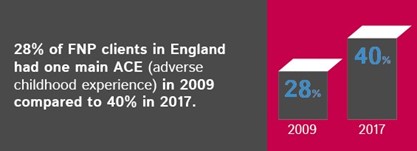We need to talk about vulnerability: Enabling responsive, long-term approaches to meet changing population profiles
- A blog from Lynne Reed, Head of Clinical Quality Improvement at the FNP National Unit
The importance of commissioning evidence-based early interventions is well documented; particularly those which mitigate against the potentially devastating impact of vulnerability factors and adverse childhood experiences (ACEs). Recent reports published by the Early Intervention Foundation and the House of Commons Science and Technology Committee argue powerfully for a national strategy for system-wide, effective, evidence-based early intervention and the long-term nature of the investment required.
Data from the FNP National Unit shows a 12 percentage point increase in the number of clients who report having experienced at least one main adverse childhood experience: from 28% in 2009 to 40% in 2017.

While some of this increase may be linked to better identification and prioritisation of clients with known vulnerabilities, it also infers a rising level of complexity in an already vulnerable client group.
It is understandable that stakeholders across local and national partnerships are being thoughtful about the challenges of making best use of constrained current resources. Not least when there is growing acknowledgement of the society-wide benefits of effective early intervention and an opportunity to reduce costs while improving the quality of lives across generations.
I recently joined the FNP National Unit as Head of Clinical Quality Improvement from a post as a local provider lead for universal children’s services in London – a portfolio which included FNP. During this time I was privileged to work within an integrated service which aspired to develop a consistent, community approach to working with vulnerable children and families. In this context I have been reflecting on the changes in client characteristics since 2009, when I first became involved in FNP as a supervisor. And, more specifically, what implications this change in characteristics has for national and local systems, and for the parents and children we work with.
An increase in the vulnerability profile of young parents and others means that the need for consistently high quality early intervention approaches is crucial. Ironically this comes at a time when services are pressured because of a range of factors, including financial constraints and staff shortages. There are no quick fixes. It is unsurprising therefore that collaborative long-term approaches which utilise the evidence base and robust data are consistently sighted as part of the solution.
It is clear that one size does not fit all. Clients who have demonstrated immense resilience in navigating challenging early experiences should expect access to approaches of the highest quality –as a national standard – to enable them to be the parents they aspire to be. This will ensure equity of access to services, effective use of resources and would mean, I’d hope, that vulnerable children are not failed. In complex local systems, strategic leads can collaborate to commission and embed evidence based interventions. Such interventions safeguard quality through robust governance, data collection and analysis. In this dynamic area of practice they also need to provide the flexibility to adapt to meet the needs of a changing society and work within an integrated system.
Recruiting and retaining a skilled workforce to work alongside families requires a thoughtful approach to attracting high calibre staff who develop a therapeutic relationship with clients. It requires upskilling staff across health and social care, including the voluntary sector, to offer a consistent approach to children and families. This can be supported by shared learning, ongoing professional development and effective supervision.
At practice level, this translates to empowering teams to critically analyse individual and local practice, using reflective approaches and systems which positively reinforce the value of ongoing learning and create the space for new insights. This adds value to the quality of the programme offer and provides role satisfaction.
Clients tell us that they value this approach and, as longer-term outcomes emerge, it is clear that the investment local commissioners are making is beneficial. The case for applying the evidence to early help offers is growing. It is expected that areas which have done this well will realise the benefits on the life experiences of vulnerable children, as well as in financial costs.
The FNP National Unit works with partners nationally and locally to support and develop thinking in this area of practice. As we build on a decade of evidence and learning from delivering the programme in England since 2007, we are keen to share the learning and be part of the debate.
In my role at the FNP National Unit, I will be working with my colleagues to ensure that the quality of programme delivery in England continues to be of high quality. I am looking forward to working with commissioners and providers of FNP, with FNP teams and with other partners as we develop a robust approach to early intervention together.
